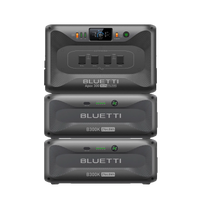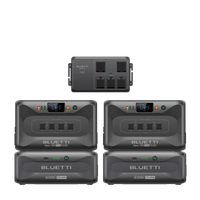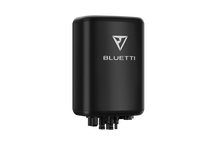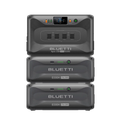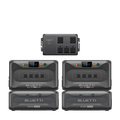Your cart is empty
Shop our productsWhat Is Solar Battery?
As the name suggests, it is a device that stores energy captured by solar panels. Solar panels capture energy from sunlight, converting it into usable energy, which the batteries store for future use. There are small and large solar batteries, making them ideal for residential and commercial use.
With solar batteries, businesses and homes can generate sustainable energy and sell the surplus to the grid. Solar batteries help reduce our carbon footprint, reducing the adverse effects of global warming. So, how does a solar battery work? Let’s find out.
How a Solar Battery Works
- Solar panels: The solar panels will capture sunlight converting it into electricity, thanks to the built-in photovoltaic (PV) cells. The cells generate unstable direct current (DC).
- Batteries: The excess direct current from the solar panels is stored in the batteries for future use.
- Inverter: If you want to use electricity from solar batteries, the inverter will convert the stored energy into AC electricity. AC is stable and ideal for use with most sensitive gadgets such as mobile phones and laptops.

When there’s minimal to no sunlight, the battery gets depleted quickly. This is where the grid comes into play. A solar system connected to the grid will have it draw power from it, recharging the batteries.
Likewise, when the batteries are fully charged, the excess electricty is channeled to the grid. This helps reduce your electricity bills.
What Is Traditional Battery?
A traditional battery is any option we use to store energy. Normal batteries are divided into non-rechargeable and rechargeable batteries.
Non Rechargeable Batteries
These are batteries with two electrodes: cathode and anode. The two are placed in electrolytes, and when connected, a chemical reaction occurs. This reaction results in a flow of electrons from the anode to the cathode.
Since the electrons have electrical energy, they can power an electric component when that energy is converted into a usable form. For example, a bulb will convert electricity into light.
Rechargeable Batteries
Rechargeable batteries allow you to reverse the reactions in the electrolytes. For example, a lithium-ion battery can discharge energy when fully charged and recharge when its energy is depleted. The discharging process involves the movement of lithium ions from the negative terminal to the positive terminal.
Recharging is the movement of lithium ions from the positive to the negative terminal. Unfortunately, can have too many cycles, meaning it will degrade over time. While not popular, nickel-cadmium batteries are used in some devices. However, they have many disadvantages such as draining when not in use.
Pros and Cons of Solar Battery
Pros
So, why should you install solar batteries in your home? Let’s find out.
-
Stores excess electricity
As you’d expect, your solar system might produce excess energy, especially on sunny days. Ideally, if you don’t have solar batteries, the extra electricty is sent to the grid. With solar batteries, you can store the extra energy for later use. As such, your devices will still run even when there’s low power generation or blackouts.
-
Reduces your carbon footprint
This is arguably the chief reason why most states are encouraging homes and businesses to embrace solar. With solar batteries, you generate green energy with little to no carbon footprint. This is because converting sunlight to electricity does not require the burning of fossil fuels.
-
Provides electricity at night
When the sun goes down, solar panels stop generating electricty. As such, the grid will automatically provide much-needed electricity. If you however have solar batteries, you’ll utilize the electricity produced during the day, without drawing from the grid.
As a result, your electricity bills will reduce. With the BLUETTI AC300 Home Battery Backup, you can power just about any electronic device from bulbs, and laptops, to ACs. And you can recharge it using your car, the grid, or solar panels.
-
Quiet
Unlike conventional backup systems, solar batteries are extremely quiet. Whether you place the batteries in your garage or basement, the noise levels will be the same. This ensures you can go about your business without disrupting your neighbors.
Cons
-
Expensive
Solar batteries are more expensive than traditional options. In addition, the installation costs are also high. Most homes break even after over five years, hence the reason why most Americans shy away from a robust solar system.
-
Limited capacity
As you’d expect, solar batteries have a limited storage capacity. If you require large amounts of energy, the only option is to buy extra batteries and solar panels, which can be expensive.
-
High maintenance costs
Another disadvantage of solar batteries is their maintenance requirements. They require regular maintenance to ensure optimal performance. Otherwise, they may become faulty within a few years. Maintenance can include replacing batteries, which is not cost-effective for most homeowners.
-
Safety concerns
While most solar batteries from reputable companies can last for extended periods, sub-standard options are susceptible to overheating. This happens due to improper installation and ventilation.
Pros and Cons of Traditional Battery
Pros
-
Reliable technology
Traditional batteries have been in use for decades. As such, the technology behind them is stable and reliable. This reliability makes them ideal for crucial applications where an uninterrupted power supply is needed, such as backup power in hospitals.
-
Diverse applications
Traditional batteries can be used in different applications ranging from small-scale to large-scale applications such as industrial backup power systems.
-
Long life cycle
Many lithium-ion batteries have a relatively long cycle life than solar options. This means they can serve you for years before getting degraded. As such, you’ll have reduced maintenance costs compared to solar batteries.
-
Fast charging
Lithium batteries support fast charging making them ideal for small-scale applications. They are also not prone to overheating when charging. As such, you can install them in different areas.
-
Easy to integrate
Since the technology behind them is stable, they are easy to integrate into existing technology and infrastructure. So, if you don’t want extensive modifications to your existing energy infrastructure, traditional batteries might be your best bet.
Cons of Traditional Batteries
-
Harmful to the environment
Most traditional batteries require the use of non-renewable resources such as lithium, cadmium, and lead. The extraction of these materials has a negative effect on the environment. Improper disposal of traditional batteries can pollute the soil and water.
-
Limited energy density
Some traditional batteries can have limited energy density than solar batteries. This affects the amount of energy that can be stored in a given volume, especially for applications requiring high storage capacity.
-
They self-discharge
Unlike solar batteries, traditional units tend to self-discharge when not in use. This leads to reduces efficiency in residential and commercial applications. They are therefore ideal for applications that require their frequent use.
-
Bulky
Most traditional batteries are bulky, limiting their range of application. While you can use the BLUETTI EB3A for outdoor activities such as camping, it would be daunting to use a normal battery. Solar batteries are easy to use, compact, and lightweight.

Comparison of Solar Battery and Traditional Battery Overview
|
Solar Battery |
Traditional Battery |
|
|
Discharge rate |
They are C10-rated meaning they emit less energy |
They are C20-rated meaning they emit more energy |
|
Price |
They are more expensive |
Relatively cheaper than solar batteries |
|
Life span |
Have a longer life span ranging from 10 to 15 years |
Have a shorter life span ranging from three to five years |
|
Maintenance |
Same |
Same |
|
Efficiency |
Their efficiency depends on charging and discharging |
Their efficiency depends on the battery technology |
|
Safety |
Safer than traditional batteries, but susceptible to overheating |
Chemical reactions make them riskier than solar batteries |
|
Weight |
Compact and lightweight |
Most are bulky |
|
Applications |
Residential and commercial |
Used for many applications such as EVs |
How to Choose Between Solar and Traditional Batteries?
-
Capacity and power
Capacity and power determine how long a solar battery will run. If you need a high-capacity battery, a solar battery would be your most ideal option. If you however want one to use on energy-intensive applications such as EVs, consider buying a traditional battery.
-
Longevity
Solar batteries tend to last longer than traditional options. However, this depends on several factors such as maintenance and cycles. If the application at hand is not long-term, consider purchasing a traditional battery.
-
Compatibility
You want to buy a battery that is compatible with your solar panel such as the BLUETTI B300S. Here, both batteries are ideal. If you choose a solar battery, check whether they are DC-coupled or AC-coupled. DC-coupled allow swift storage of solar energy from the solar panels, making them the most ideal option.
-
Depth of discharge
Depth of discharge is the energy you can use without the battery getting depleted. Solar lithium-ion batteries have a DoD of 90%, meaning you should recharge them after depleting 90% of the energy.
Traditional lead-acid batteries on the other hand have a 50% DoD, especially those used for residential power backup.
Conclusion
As you can see, solar batteries offer more benefits than traditional options. They are lighter, compact, more efficient, and eco-friendly. Traditional batteries are often made of toxic materials that can pollute the environment. They also have low energy density.
Shop products from this article
Be the First to Know
You May Also Like

What Does a 30% Federal Solar Tax Credit Mean and How to Apply?
Governments around the world are offering programs that encourage homeowners to switch to solar energy. Among the most notable programs is the 30% Federal Solar Tax Credit. It reduces your...

Deadly Flooding Devastates U.S. South and Midwest — What You Need to Know















